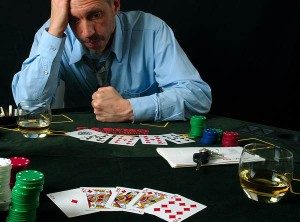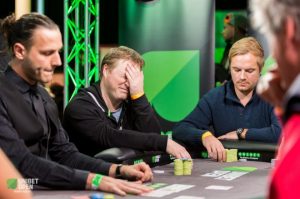The poker face is a well-known phenomenon, and although it isn’t the easiest thing to master, being able to control your emotions during your game can make all the difference to your success. Whether you’re playing in a small game with a few friends or in a serious tournament, the same principle applies. Keeping a straight face regardless of the hand you’re dealt could make all the difference to the amount of money you’re able to win. Losing your cool can be an absolute disaster. Giving away that you have an amazing hand, or, conversely, that you have the worst hand in the world will not only mark you out as an amateur but will also prevent you from being as successful as you could be.

Why Bother to Control Your Emotions?
 There are many reasons why you should try your hardest to control your emotions at the gaming table. For a start, the more stressed you feel and the angrier you become, the less you can focus on the game and the more stupid mistakes you’re likely to make. This leads to a negative feedback loop where you become more irritated, lose even more focus, etc. It isn’t all just about negative emotions, either. Allowing excitement to get out of hand can also distract you from what’s going on at the table and could lead to critical errors.
There are many reasons why you should try your hardest to control your emotions at the gaming table. For a start, the more stressed you feel and the angrier you become, the less you can focus on the game and the more stupid mistakes you’re likely to make. This leads to a negative feedback loop where you become more irritated, lose even more focus, etc. It isn’t all just about negative emotions, either. Allowing excitement to get out of hand can also distract you from what’s going on at the table and could lead to critical errors.
Also, no matter how good you think your poker face is, somebody will always be able to read you. There will always be a telltale sign that you’re angry, excited or worried. By trying to eliminate as much emotion as possible from the game, you’ll be making yourself harder to read.
Projecting a “don’t care” attitude is also surprisingly scary to the other players. If you don’t appear to be taking the outcome of the game seriously, others at the table will become unnerved and that can put them off their stride. You don’t have to be a poker star to project this kind of attitude. You just need to limit how much effect the hand will have on your emotions.
So, how do you control your emotions most effectively? Here are some top tips.
Stay Hydrated
It may sound like too simple a tip to work but staying hydrated at the poker table can work wonders when it comes to keeping your mind clear. If you drink a lot of alcohol, there’s a good chance you’ll end up playing recklessly and lose too much. Drink a lot of energy drinks or coffee, and you’ll end up fading out by the end of the night. Sipping water regularly is the best way to keep a clear head and to maintain focus.
Take A Break
 It’s hard to stay calm if you’ve just lost a pot. But, instead of panicking and placing a risky wager, take some breathing time, reassess your situation and re-evaluate whether you should keep playing. Losing the pot isn’t necessarily going to prevent you from winning another hand, so lay out your goals, determine how close you are and then decide whether it’s worth your while. It always makes sense to take a walk on the floor when you’ve just lost a hand. Physically moving away from the table immediately helps to give you a better perspective and lets you take a few deep breaths, to get your blood flowing more effectively and refresh your mind. Even if you haven’t lost a hand, it still is a good idea to take regular breaks.
It’s hard to stay calm if you’ve just lost a pot. But, instead of panicking and placing a risky wager, take some breathing time, reassess your situation and re-evaluate whether you should keep playing. Losing the pot isn’t necessarily going to prevent you from winning another hand, so lay out your goals, determine how close you are and then decide whether it’s worth your while. It always makes sense to take a walk on the floor when you’ve just lost a hand. Physically moving away from the table immediately helps to give you a better perspective and lets you take a few deep breaths, to get your blood flowing more effectively and refresh your mind. Even if you haven’t lost a hand, it still is a good idea to take regular breaks.
Deep Breathing
It can be hard when things are going badly to calm down and to think rationally. The only way you’re going to make it work is to practice mindfulness, meditation, and deep-breathing techniques when you’re not at the table. You need them to be second nature so they come automatically when you’re at the table. Starting to practice mindfulness for the first time when you’ve just lost a hand probably isn’t going to work!
Listen to Music
Although playing a round of poker with someone who has earphones jammed in their ears can be irritating, they could well have the right idea. Many professionals agree that music is the key to success and think that listening to an iPod at the gaming table could help players to stay cool, calm, and collected. Avoiding singing during your hand is probably a good idea, though!
Discussing Your Problems
 Talking always helps. A problem shared is a problem halved. So, if you’re furious about your latest loss, it’s important to discuss the situation with your buddies. Yes, they may have heard you talk about poker a million times before, but isn’t that what friends are for? Take a break from the table, get up, and talk to your friends mid-game about how everything is going wrong. Who knows, they might even be able to offer you some great advice.
Talking always helps. A problem shared is a problem halved. So, if you’re furious about your latest loss, it’s important to discuss the situation with your buddies. Yes, they may have heard you talk about poker a million times before, but isn’t that what friends are for? Take a break from the table, get up, and talk to your friends mid-game about how everything is going wrong. Who knows, they might even be able to offer you some great advice.
Expectations and Acceptance
One of the biggest problems in poker that leads to anger and emotional outbursts is the difference between expectation and reality. If you have a great hand and expect to win, but then things go wrong toward the end of the round, you’ll naturally be angrier than if you had a terrible hand to start with. That’s because you were expecting a better outcome. While it’s natural to feel irritation and anger in this situation, it’s important to try your hardest to accept that there is always a fair chance of losing the hand and that nothing you can do could change it. Being honest about your emotions can help because this will also enable you to identify the triggers for your reactions. This will help you to prevent the anger next time.
Let Go of Emotions
 The Sedona Method is one way in which you can release your emotions as you experience them, and this can be a useful tool at the poker table. Simply welcome whatever feeling you’re experiencing, acknowledge it, and then ask whether you could let it go, whether you would let it go, and then when. The ideal responses to those three questions are yes, yes, and now. However, the principle behind the method is that accepting the feeling is better than resisting it. You need to practice this way of letting your emotions go when you aren’t playing poker so you can make better decisions when you do. You’ll feel more relaxed even if you lose, and you’ll give off a more confident attitude that could put the other players off their game.
The Sedona Method is one way in which you can release your emotions as you experience them, and this can be a useful tool at the poker table. Simply welcome whatever feeling you’re experiencing, acknowledge it, and then ask whether you could let it go, whether you would let it go, and then when. The ideal responses to those three questions are yes, yes, and now. However, the principle behind the method is that accepting the feeling is better than resisting it. You need to practice this way of letting your emotions go when you aren’t playing poker so you can make better decisions when you do. You’ll feel more relaxed even if you lose, and you’ll give off a more confident attitude that could put the other players off their game.
Get Professional Help
Sometimes, the best way to handle things is to go straight to the top. One way to make sure you’re addressing your emotions effectively is to consult a mentor or coach who can assist you in controlling your emotions more effectively. While this is probably only a realistic option for a professional player, it is certainly something worth considering if you play a lot or if you play for high stakes. A coach can review upsetting hands with you and increase your self-awareness about why you find them so upsetting. Knowing the things that are likely to trigger your negative emotions will enable you to find ways of neutralizing them before they tip you over the edge in an important game.
Disclaimer: All images are copyright to their respective owners and are used by USA Online Casino for informational purposes only.










